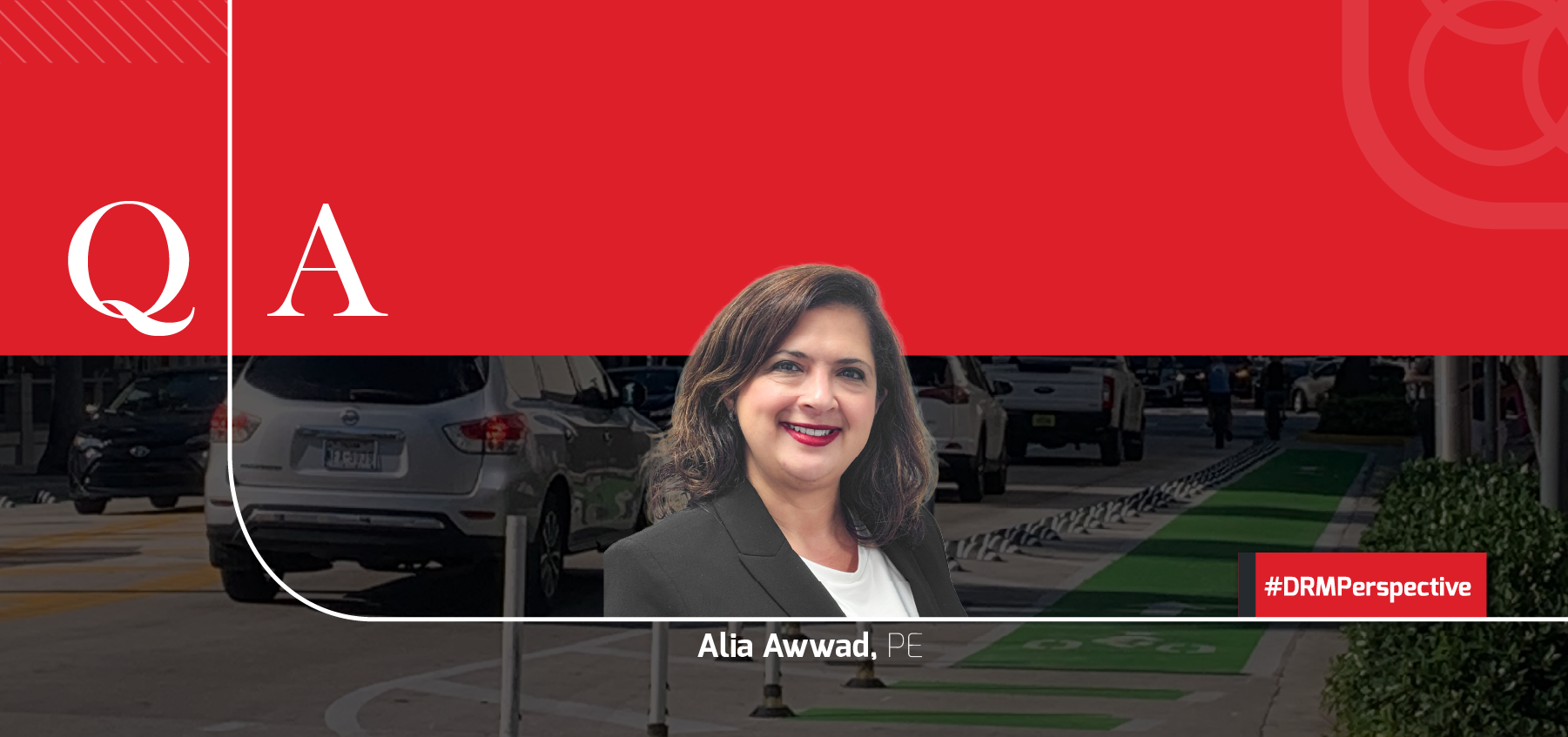Every road, sidewalk, and bike lane has the potential to save – or cost – lives. DRMP’s transportation experts are raising the bar for roadway safety by earning the Roadway Safety Professional Level 1 (RSP1) certification, a credential that demonstrates advanced expertise in crash prevention and safer road design.
The Transportation Professional Certification Board, in collaboration with transportation and safety organizations in the United States and Canada, introduced the RSP1 certification in 2018 to raise the standard of safety within the profession.
DRMP Project Manager James Rutherford, PE, RSP1; DRMP Traffic Design Group Leader Brittany Groome, PE, PTOE, RSP1; and Orlando Assistant Roadway Group Leader Kim Sadowski, PE, RSP1, use this certification to apply proactive, data-driven safety strategies in every project. Their work aligns with Vision Zero, a global initiative launched in Sweden that aims to eliminate all traffic fatalities and serious injuries while promoting safe, equitable mobility for everyone.
A Commitment to Proactive Safety
Rutherford earned his RSP1 certification in 2024, recognizing the growing emphasis on roadway safety within the transportation industry.
“The RSP has become a big focus with a lot of state departments of transportation (DOT), so I thought it would be beneficial to get,” he said. “Safety has always been important, and it’s becoming even more so with initiatives like Vision Zero.”
To earn the credential, Rutherford completed an eight-hour study course before taking the 75-question certification exam for more than three hours at a testing center. He noted the program also offers a second level, the RSP2, which addresses more advanced safety topics and is more challenging to achieve.
“The safety work really focuses on intersections and improving bike and pedestrian facilities,” Rutherford said. “I don’t think a lot of people have this certification yet, but it helps you understand how to make the roads safer and makes you more aware of the resources you have to examine possible safety solutions in your design.”
He added that the certification helps engineers think more intentionally about safety in every design.
Groome earned her certification in 2022 while leading safety-focused projects for the Virginia Department of Transportation (VDOT). She said it helped elevate the work she was already doing.
“I wanted to deepen my understanding of the data-driven principles behind crash reduction and roadway design,” Groome said. “The certification strengthened the way I approach projects. I now focus on how each part of a road or intersection affects driver behavior and safety, and I plan proactive measures that fit the unique conditions of each project.”
Sadowski earned her RSP1 in 2023 to expand her expertise in roadway safety.
“All our transportation projects revolve around providing a safe design from a crosswalk to an interstate,” she said. “The certification has helped me evaluate projects with a focus on crash trends, human factors, and proven countermeasures rather than relying solely on traditional design standards.”
Turning Data into Safer Infrastructure
RSP1-certified professionals bring a proactive, systems-based approach to roadway safety, often called systemic safety. Instead of addressing only areas with known crash histories, they identify roadway characteristics that indicate higher risk before crashes occur.
“Rather than focusing only on ‘hot spots,’ I now look for patterns in roadway characteristics that might indicate higher crash potential, even if no history exists yet,” Groome said.
Applying RSP1 principles helps DRMP’s experts make design decisions that balance safety with efficiency and practical considerations.
“When evaluating alternatives or reviewing designs, I use RSP1 principles to weigh safety tradeoffs alongside operational efficiency,” Groome said. “It helps me frame discussions with clients and stakeholders, especially when explaining why certain treatments like access management or improved sight distance can save lives even if they slightly impact capacity or cost.”
Sadowski noted how a certified safety professional can connect technical expertise with community confidence.
“Having a qualified safety professional on the team builds trust with communities and ensures people can move safely, whether they’re driving, biking, or walking,” she said.
A Mindset Shift for Safer Communities
The RSP1 certification creates a mindset shift toward proactive, human-centered design. Groome said every design decision affects someone’s life and safety, whether it involves a driver, pedestrian, or cyclist.
“Having RSP1-level expertise ensures we’re applying evidence-based strategies and understanding crash causation, not just designing to meet a checklist,” she said. “It elevates the profession and the quality of the solutions we deliver.”
Sadowski echoed this perspective, noting that safety applies to every transportation project.
“This people-first approach ensures DRMP’s clients and communities benefit from safer, smarter infrastructure that anticipates risk rather than reacting to past incidents,” she said. “It prioritizes human life in every design decision.”
Groome highlighted DRMP’s evolving safety philosophy, which goes beyond traditional engineering to focus on prevention, collaboration, and measurable results.
“Our clients benefit from a proactive approach to safety that aligns with Vision Zero goals, helping communities make targeted investments that yield measurable improvements,” she said.
As roadway safety continues to evolve, DRMP’s RSP1-certified experts lead the way by applying data-driven insight, practical solutions, and a focus on the people who rely on every road, intersection, and sidewalk designed under their watch.
















